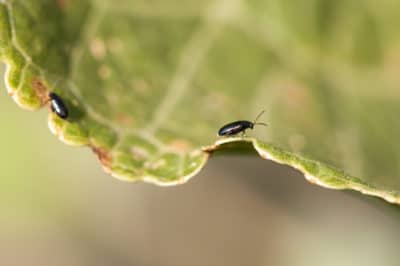How to Identify Flea Beetles
Below are the common characteristics of flea beetles.
- Oval, black adult insects
- About 1/16-inches long
- Thick, rear legs for jumping
- Antennae are 2/3 length of the body
- Slight hair on wing covers
- White or yellow-gray eggs
- Leaves have small circular holes
What Is a Flea Beetle’s Life Cycle?
These beetles overwinter in leaves, dead crops and wooded areas. In the spring, usually in late March when the temperature is about 50 degrees, the females lay eggs in the soil, leaves and near the roots of plants.
After about one week, the eggs hatch and tiny, white larvae begin feeding on the roots of eggplant seedlings for about three weeks. You won’t notice any damage to your crop until the larvae grow into adult beetles. This takes from a week to 10 days and then they begin eating the eggplant leaves for up to 2 months. Your garden can have as many as three generations in one season.
Damage to Eggplant Leaves
Adult flea beetles feed on the underside of leaves and stems of the eggplant, creating small shotgun holes and pits. This foliage damage causesyour plants to wilt and stunts their growth. Small plants suffer the most from flea damage, while adult eggplants with four or five leaves can usually survive.
How to Control Flea Beetles
You can do a few things to minimize the damage caused by flea beetles. At the end of the growing season, remove any plant debris that flea beetles could use to winter over. Weeding around your garden also helps reduce the beetles food supply, especially pokeweed and horse nettle.
You can also delay planting until the seedlings are big enough to withstand flea beetle infestations, and plant trap crops that surround your garden. If your seedlings start wilting and you see damage, applying insecticides to the foliage will take care of the problem. Unfortunately, organic chemicals cannot eliminate flea beetles.
